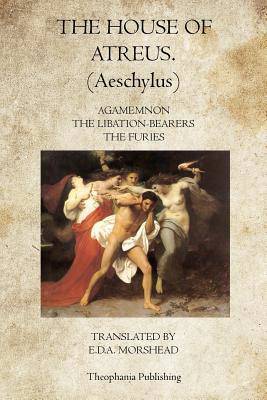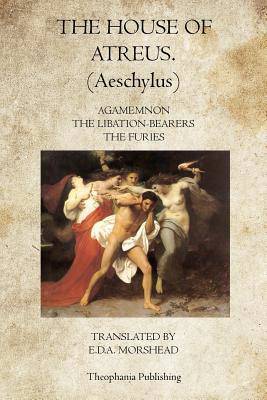
- Retrait gratuit dans votre magasin Club
- 7.000.000 titres dans notre catalogue
- Payer en toute sécurité
- Toujours un magasin près de chez vous
- Retrait gratuit dans votre magasin Club
- 7.000.0000 titres dans notre catalogue
- Payer en toute sécurité
- Toujours un magasin près de chez vous
Description
Thank you for checking out this book by Theophania Publishing. We appreciate your business and look forward to serving you soon. We have thousands of titles available, and we invite you to search for us by name, contact us via our website, or download our most recent catalogues. Of the life of Aeschylus, the first of the three great masters of Greek tragedy, only a very meager outline has come down to us. He was born at Eleusis, near Athens, B. C. 525, the son of Euphorion. Before he was twenty-five he began to compete for the tragic prize, but did not win a victory for twelve years. He spent two periods of years in Sicily, where he died in 456, killed, it is said, by a tortoise which an eagle dropped on his head. Though a professional writer, he did his share of fighting for his country, and is reported to have taken part in the battles of Marathon, Salamis, and Plataea. Of the seventy or eighty plays which he is said to have written, only seven survive: "The Persians," dealing with the defeat of Xerxes at Salamis; "The Seven against Thebes," part of a tetralogy on the legend of Thebes; "The Suppliants," on the daughters of Danaüs; "Prometheus Bound," part of a trilogy, of which the first part was probably "Prometheus, the Fire-bringer," and the last, "Prometheus Unbound"; and the "Oresteia," the only example of a complete Greek tragic trilogy which has come down to us, consisting of "Agamemnon," "Choephorae" (The Libation-Bearers), and the "Eumenides" (Furies). The importance of Aeschylus in the development of the drama is immense. Before him tragedy had consisted of the chorus and one actor; and by introducing a second actor, expanding the dramatic dialogue thus made possible, and reducing the lyrical parts, he practically created Greek tragedy as we understand it. Like other writers of his time, he acted in his own plays, and trained the chorus in their dances and songs; and he did much to give impressiveness to the performances by his development of the accessories of scene and costume on the stage. Of the four plays here reproduced, "Prometheus Bound" holds an exceptional place in the literature of the world. (As conceived by Aeschylus, Prometheus is the champion of man against the oppression of Zeus; and the argument of the drama has a certain correspondence to the problem of the Book of Job.) The Oresteian trilogy on "The House of Atreus" is one of the supreme productions of all literature. It deals with the two great themes of the retribution of crime and the inheritance of evil; and here again a parallel may be found between the assertions of the justice of God by Aeschylus and by the Hebrew prophet Ezekiel. Both contend against the popular idea that the fathers have eaten sour grapes and the children's teeth are set on edge; both maintain that the soul that sinneth, it shall die. The nobility of thought and the majesty of style with which these ideas are set forth give this triple drama its place at the head of the literary masterpieces of the antique world.
Spécifications
Parties prenantes
- Auteur(s) :
- Editeur:
Contenu
- Nombre de pages :
- 196
- Langue:
- Anglais
Caractéristiques
- EAN:
- 9781770832275
- Date de parution :
- 07-06-11
- Format:
- Livre broché
- Format numérique:
- Trade paperback (VS)
- Dimensions :
- 152 mm x 229 mm
- Poids :
- 267 g

Les avis
Nous publions uniquement les avis qui respectent les conditions requises. Consultez nos conditions pour les avis.






